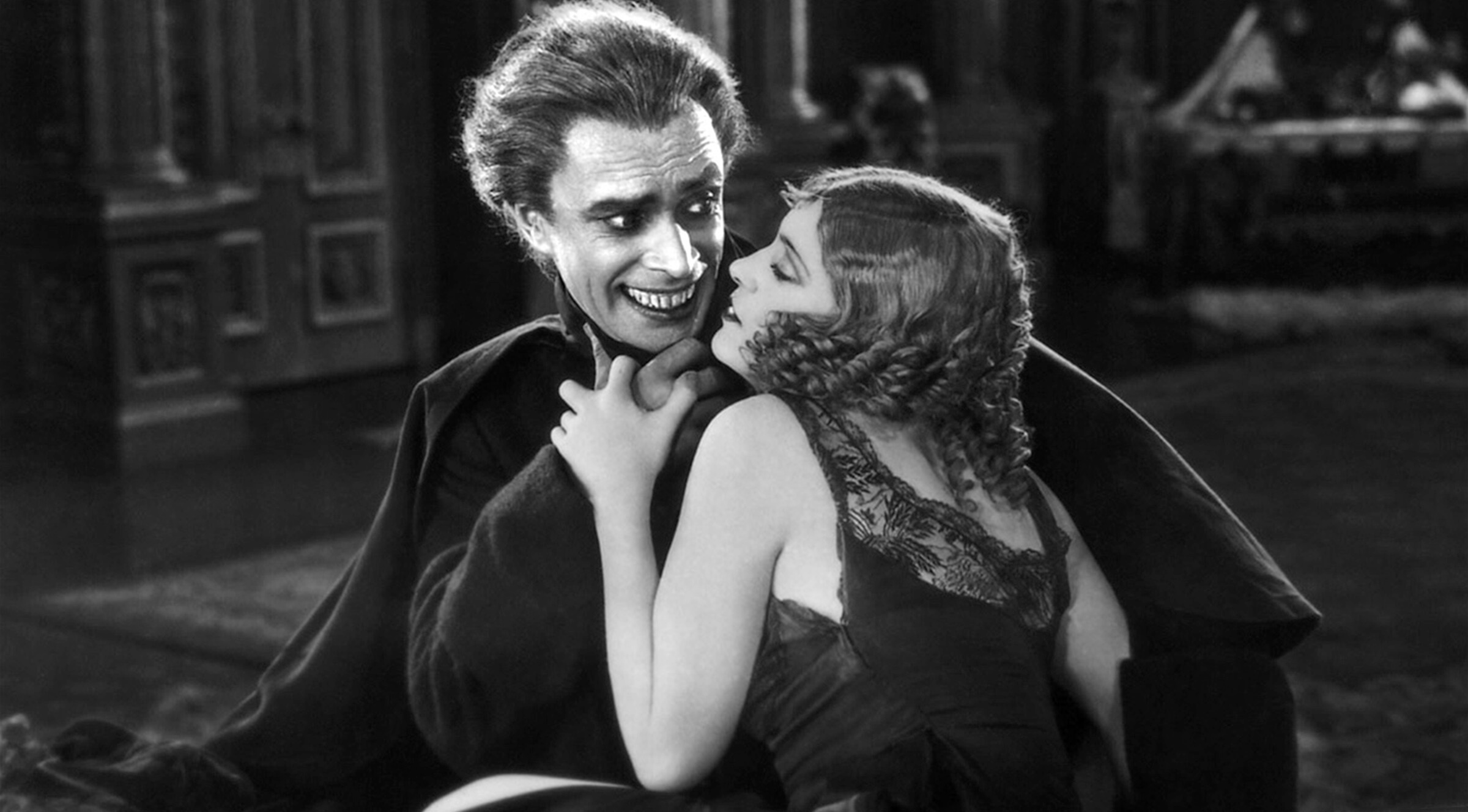You can read the program essay for our 2018 screening of The Man Who Laughs here
Universal Pictures founder Carl Laemmle had a fascination with French literature that resulted from a combination of his first-generation immigrant status, his intuitive marketing savvy, and his assimilation of 19th Century American Midwestern values. The son of a Jewish-German peddler, Laemmle came to America in 1884, settling first in Chicago before drifting around the Midwest, trying his hand at farmwork before taking a succession of bookkeeping jobs. After building a mail-order catalogue business for a clothing store in Oshkosh, Wisconsin, Laemmle abruptly quit in 1905, opening a movie theater in Chicago. By the end of 1906, Laemmle had both a chain of theaters and his own film distribution service. In 1909, Laemmle became head of the Independent Motion Picture Company, or IMP, a leader of the independent film companies that were battling the Edison-Biograph trust. By 1912, IMP had been absorbed into the larger Universal Film Manufacturing Company, and Laemmle was at the reins when operations were moved in 1913 to Universal City, in California’s San Fernando Valley.
Laemmle made sure to keep his name closely identified with his product. Having started his career in the movies as an exhibitor, he directly addressed theater owners by publishing a series of ghost-written articles in Universal Weekly, a newsletter sent to all of his customers, which soon earned him the sobriquet “Uncle Carl.” Every film produced by Universal bore the legend “Carl Laemmle Presents” ahead of the title. After importing the 1925 French Pathé adaptation of Victor Hugo’s Les Misérables, he promoted it by sponsoring the “Carl Laemmle-Victor Hugo Scholarship,” a $6,000 tuition prize awarded to high school students for the best essays on the topic “What ideals for life do you find in Les Misérables?”
In American entrepreneurial fashion, Laemmle’s interest in higher education and culture was not born of Platonic idealism; he expected a return on his investment. While the novels of Victor Hugo might represent “literature,” Notre-Dame de Paris is also a bodice-ripper with a tailor-made role for Laemmle’s hugely popular box office attraction Lon Chaney, “The Man of a Thousand Faces,” who was born to play Quasimodo. Laemmle returned to Hugo for the 1927 film of The Man Who Laughs, but this time he looked to Germany to replace Chaney.
Conrad Veidt was 19 years old when he joined Max Reinhardt’s Berlin Theater company in 1912. After serving in the German army during World War I, Veidt returned to the Reinhardt company in 1917. With German film production centered in Berlin, Veidt appeared in many films while maintaining a busy theatrical schedule. He made a number of movies for Richard Oswald, a producer of Aufklärungfilm, social dramas that exploited topical and risqué subjects. In Anders als die Andern (Different From the Others, 1919), Veidt portrayed a closeted homosexual violinist threatened by an extortionist aware of his passion for a student. The film was an attempt to build public opposition to Paragraph 175, a German law criminalizing homosexuality (the film created a sensation, but the law was not repealed until 1994).
A slim 6’3” figure with angular features and piercing eyes, Veidt was able to move easily between romantic leads and character parts. His roles in Der Kabinett des Doktor Kaligari (The Cabinet of Dr. Caligari, 1920) and Orlacs Hände (The Hands of Orlac, 1924), allowed Veidt to create archetypal characters that continue to influence horror films even today. After seeing Veidt’s portrayal of Ivan the Terrible, 16th Century Tsar of Russia, in Das Wachsfigurnekabinett (Waxworks, 1924), John Barrymore brought him to the United States to play the 15th Century French King Louis XI in The Beloved Rogue (1927). The Man Who Laughs failed to achieve the box office success of Laemmle’s previous gothic spectaculars The Hunchback of Notre Dame and The Phantom of the Opera, possibly due to the fact that, unlike Lon Chaney’s monsters, Veidt’s character is an essentially decent man.
Veidt abandoned Hollywood in 1928, convinced that his foreign accent and limited command of English would not be welcome in America during the new era of talking pictures. He made several sound films in Germany, but he soon became intensely troubled by the rise of the Nazi Party. Veidt’s third wife, Ilona “Lily” Prager, was Jewish, and he was also a friend of Hans Grohman, a homosexual artist and anti-fascist writer who the Nazis executed gangland-style in 1933. Having already appeared in several British films, Veidt made plans to move to England. He wrote the single word Jude (Jew) on the official form requesting his reason for leaving Germany, although he had been born of Christian parents.
When Veidt returned to Germany in 1934 to fulfill a contractual obligation for the film Wilhelm Tell, he was kidnapped by Nazi agents who demanded that he withdraw from a planned British production of Jew Süss, an adaptation of a 19th century novel condemning German anti-Semitism. When British producer Michael Balcon inquired as to Veidt’s whereabouts, German officials responded that the actor was too ill to travel. Balcon arranged for a British physician to go to Germany to examine Veidt, after which the Nazis chose to release the actor rather than risk a diplomatic incident. Following his release, Veidt completed Jew Süss and the Nazis declared him an enemy of the state. He arranged for the removal of his second wife and their daughter to neutral Switzerland, and he never returned to Germany.
He continued to act in British anti-Nazi films, and he signed his savings over to the British war effort as an interest-free loan. In 1939, he became a British subject. While in the United States to supervise the preparation for American release of Contraband (1940), for which he was both the producer and the star, Veidt was cast by Louis B. Mayer in the anti-Nazi propaganda film Escape. Veidt decided to stay and pursue an acting career in American movies, and he became best known for his portrayals of evil Nazi characters culminating in his performance as Major Strasser in Casablanca (1942). He sent his earnings from these pictures to the British government. At the age of 50, he died of a heart attack on a Hollywood golf course.
Laemmle’s “family business” approach did not adapt well to the era of talking pictures. Facing insurmountable debt, Laemmle surrendered control of Universal in 1936. Before his death at the age of 72 in 1939 (from cardiovascular disease), Laemmle personally arranged and financed the emigration of hundreds of German Jews who were fleeing the Nazi Holocaust.
Presented at SFSFF 2008 with live music by Clark Wilson on the Mighty Wurlitzer

